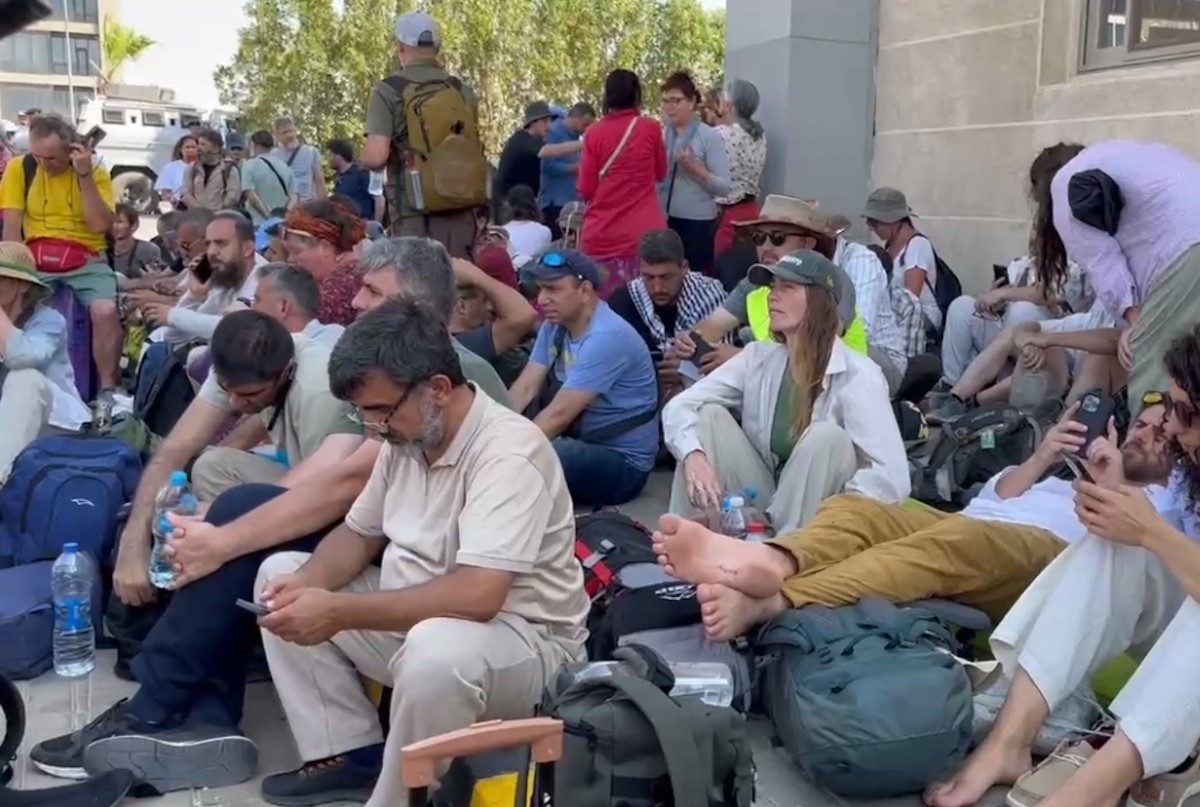In Egypt, hundreds of activists, including many Canadians, have been arbitrarily detained since yesterday.
Around 4,000 people from 84 countries have gathered in Cairo as part of the World March to Gaza, a peaceful initiative led by a grassroots, non-partisan movement of the same name. The mobilization aims to denounce the blockade, famine, and ongoing genocide in Gaza.
What’s happening on the ground, and why is Egypt obstructing this citizen-led initiative?
We spoke with activists, a journalist on the ground, and a Middle East expert to better understand the situation.
“One person was separated from the [Canadian] group at a checkpoint, and we haven’t heard from them in nearly seven hours. His wife, who is also here, is in a panic,” shared Tatiana Harker, vice-president of the Canadian delegation to the World March to Gaza.
About a hundred Canadians joined the initiative. But once on the ground, around sixty of them were arbitrarily detained and had their passports confiscated.
“Six members of the delegation were kidnapped in the city of Al-Arish and later released. Others were dropped off in the middle of nowhere (...),” Harker adds.
Some delegation members were intercepted directly in their hotels, raising serious concerns about surveillance by Egyptian authorities.
Originally, delegations were scheduled to arrive in Cairo between June 11 and 12. On June 13, buses were supposed to depart toward Al-Arish, a city in the Sinai Peninsula about 350 kilometers east of the capital. From there, participants planned a 48-kilometer march toward Rafah, on the border with Gaza.
The goal was to maintain symbolic pressure on Egyptian authorities to open the crossing for humanitarian aid.
Egypt blocks the march from proceeding
“They forced people onto buses, hit some of them, took others away... As soon as filming started, [the police] tried to grab the phones, steal them, smash them on the ground,” said Lucy Davalou, an independent journalist who herself was trapped on a bus by Egyptian police.
“The Egyptian state (...) is known for its authoritarian power,” explains Sami Aoun, Director of the Observatory on the Middle East and North Africa at the University of Sherbrooke. “This regime is highly suspicious of any mobilization, whether inside civil society or among diasporas, where there’s fear of influence from the muslim community or other liberal democratic movements.”
The country has also signed peace agreements with Israel and does not want to be “challenged on that front,” Aoun adds. “[The Egyptian authorities] view any demonstration as an expression of freedom by groups, NGOs, or individuals accusing them of cowardice or complicity with Israel.”
However, the purpose of the march was to shed light on the genocidal situation in Gaza, according to Harker. She regrets that “media attention is being diverted away from Gaza because of this.”
By the publication of this article, it is nearly 9 pm in Montreal, 5 am in Egypt. Hundreds of demonstrators may spend the whole night trapped on buses, waiting to be deported. Earlier that night, we received videos of them singing together in support of Palestine’s liberation.
In Montreal, a protest is being held outside the Egyptian consulate to amplify their voices.
Meanwhile, in Libya, a thousand protesters from Mauritania, Morocco, Algeria, and Tunisia—on their way to Rafah—are now stuck in the east of the country.







%20(3)%20(1).jpg)
%20(1).jpg)
%20(2).jpg)